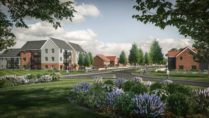Park Homes in the spotlight!
By Mike Hardware, Associate Director
The popularity of mobile homes has grown significantly in recent years. No longer the preserve of the over-55s or retiring couples, rising house prices and decreasing affordability have led to these homes becoming more mainstream with over 3,000 sites across the UK. But the peace and quiet of these serene oases is potentially under threat by overzealous local authorities.
Park homes, as they are better known, have been around since the 1940s, which is when Warfield Park in Bracknell was first established. The Mobile Homes Act of 1947 enshrined the particular status of park homes as homes that were capable of being moved. This was followed by two more acts in the 1960s further defining what has become an anomaly in planning terms: a dwelling, but not a home.
Warfield Park is viewed by many as one of the best sites in the country. It has just over 500 park homes laid out to provide an attractive, mature countryside setting. The park is very popular with waiting lists to purchase and rent park homes.
Recent changes in planning regulations provided greater permitted development (PD) rights to businesses and home owners. Introduced in 2015, certain developments are now allowed to take place without permission, such as loft conversions and small extensions. But the legislation highlighted the fact that park homes do not attract such PD rights. In fact, park home owners do not have any PD rights at all other than what is specified in the site licence, which is issued under different legislation. This means that if residents want a pond, pergola or even a patio, they would technically all need planning permission.
Bracknell Forest Council (BFC) decided to audit all park homes sites, starting with Warfield Park. It identified over 200 residences in the park which had unauthorised development – almost half the site. Barry Sumner, managing director of Warfield Park, explained: “The laws concerning development rights on park home sites have not changed, they have been in place for decades. It is not clear why BFC has undertaken this exercise as there have been no specific complaints made to the council which would prompt such an investigation.”
This view was shared by Ros Pritchard OBE, director general of the British Holiday & Home Parks Association (BH&HPA): “We are concerned that homeowners on a member park should not be subject to unnecessary or disproportionate planning control. This is particularly so on a park such as Warfield where homeowners are elderly and many are vulnerable.”
Following the initial tranche of 200-odd enforcement letters and the not unexpected uproar, the Council decided to hold a public meeting. This was chaired by the Portfolio Holder responsible for planning, Cllr Chris Turrell, supported by planning officers. One key question the 100 or so residents who attended asked was what the council was trying to achieve by going through this enforcement ritual. The response was to ‘regularise’ the situation.
The next series of questions surrounded what ‘harm’ these unauthorised developments were causing. Although case-specific, in many instances the harm is limited to “development that does not have planning permission but which requires it”. This is not ‘harm’. Officers did subsequently admit that many of the breaches would be considered de minimus.
Many of the residents have been on the park for decades, which means much of the illegal development could not be enforced as it had been enjoyed for over four years. Officers suggested that residents should regularise the situation as it may become an obstacle when they wanted to sell their homes, although these breaches would not come up on legal searches.
Residents argue that whether a caravan or a brick and mortar house, they are still their home and they should have the same rights. This argument brings in the European Convention on Human Rights where, under Article One, individuals have a right to “peaceful enjoyment of their possessions”. Article 14 also comes into play which protects against discrimination, with one of the types of discrimination being the property you live in.
Ros Prichard added: “Respecting their rights as homeowners means that they should not be treated differently from the owners of brick-and-mortar properties unless there is a very good reason.”
Barry Sumner continued: “Common sense has to prevail otherwise the wonderful environment my residents have enjoyed for decades could be damaged, and if other councils adopt the same approach, this popular type of lifestyle could be irrevocably damaged across the country.
“Potential purchasers will understandably be put-off by this ham-fisted approach to planning enforcement, and the uncertainty which currently exists.”
This article was written by Michael Hardware, Associate Director, Chelgate Local, and was published by PlacemakingResource on 11th July 2018. It can be viewed at https://www.placemakingresource.com/article/1487507/opinion-pressure-park-homes (subscription required).

Strategic land and site promotion
“Chelgate gives a real insight into political thinking at all levels and all political persuasions, …

Energy and infrastructure
From new nuclear and unconventional gas to renewables, waste and airports, our team has worked …


